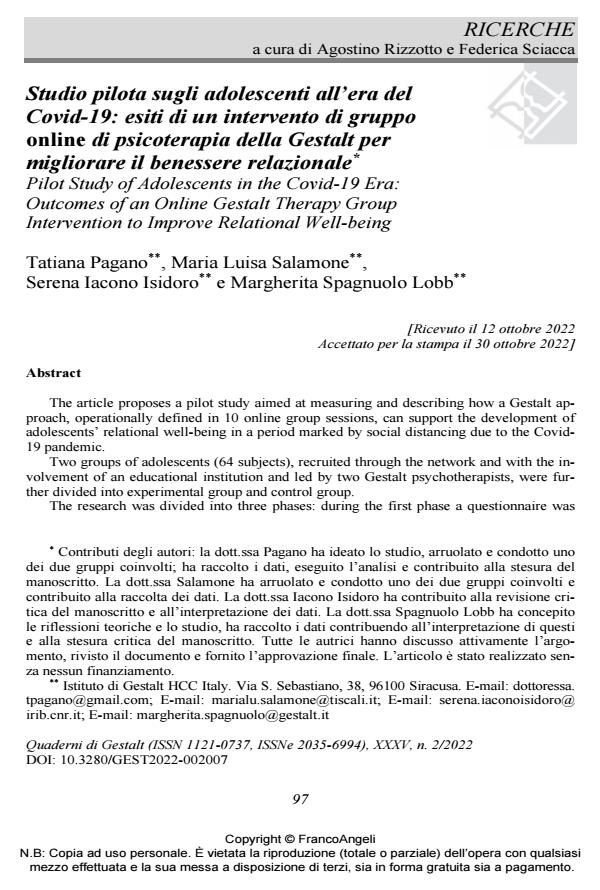Pilot Study of Adolescents in the Covid-19 Era: Outcomes of an Online Gestalt Therapy Group Intervention to Improve Relational Well-being
Journal title QUADERNI DI GESTALT
Author/s Tatiana Pagano, Maria Luisa Salamone, Serena Iacono Isidoro, Margherita Spagnuolo Lobb
Publishing Year 2022 Issue 2022/2
Language Italian Pages 11 P. 97-107 File size 170 KB
DOI 10.3280/GEST2022-002007
DOI is like a bar code for intellectual property: to have more infomation
click here
Below, you can see the article first page
If you want to buy this article in PDF format, you can do it, following the instructions to buy download credits

FrancoAngeli is member of Publishers International Linking Association, Inc (PILA), a not-for-profit association which run the CrossRef service enabling links to and from online scholarly content.
The article proposes a pilot study aimed at measuring and describing how a Gestalt ap-proach, operationally defined in 10 online group sessions, can support the development of ad-olescents’ relational well-being in a period marked by social distancing due to the Covid-19 pandemic. Two groups of adolescents (64 subjects), recruited through the network and with the in-volvement of an educational institution and led by two Gestalt psychotherapists, were further divided into experimental group and control group. The research was divided into three phases: during the first phase a questionnaire was ad-ministered for the collection of socio-demographic information and tools aimed at measuring dimensions such as empathy, resonance and body awareness, and assessing the presence of risk factors. During the second phase, the two experimental groups participated in 10 audio-recorded online group meetings; at the end of each meeting, the conductors filled out the Ther-apist Experience Journal to note observations on the research process and group dynamics. In the third phase, questionnaires were re-administered to check for any differences in scores be-tween the pre and post-intervention and between the experimental and control groups. The descriptive analysis allowed to verify the equivalence and the presence of homogenei-ty within the two groups. The inferential analysis, using a two-way mixed ANOVA (Analysis of Variance), showed a significant increase, in both experimental groups involved, in empathy, resonance and body awareness, as well as a decrease in anxiety and depression scores, high-lighting the effectiveness of the proposed intervention. The results seem to support the efficacy of the Gestalt therapy approach carried out online in a group setting in improving adolescents’ relational well-being, which is essential for building a solid identity, along with adequate social skills, and stable social relationships over time.
Keywords: Adolescence, group therapy, Gestalt therapy, online, relational well-being.
Tatiana Pagano, Maria Luisa Salamone, Serena Iacono Isidoro, Margherita Spagnuolo Lobb, Studio pilota sugli adolescenti all’era del Covid-19: esiti di un intervento di gruppo online di psicoterapia della Gestalt per migliorare il benessere relazionale in "QUADERNI DI GESTALT" 2/2022, pp 97-107, DOI: 10.3280/GEST2022-002007